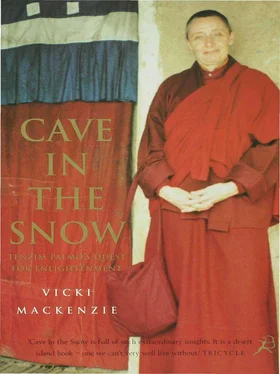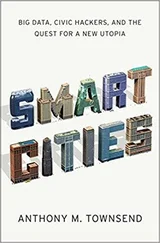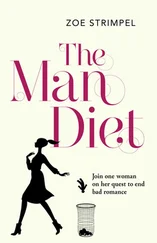Home for the first twenty years of her life was above a fish shop at 72 Old Bethnal Green Road, Bethnal Green, just round the corner from the historical Old Roman Road in the heart of London’s East End. It was about as far away as you could get from the soaring snow-capped mountains and vast open vistas of the Himalayas where her soul was to run free. Today, 72 Old Bethnal Green Road does not exist and Bethnal Green itself, with its elegant squares, tiny lanes and proximity to the City, is in danger of becoming chic; but when Tenzin Palmo got there it was a mass of rubble after the Blitz, and this was how she thought it had always looked before she was old enough to know better. It was crowded, blackened, smog-filled, with hardly a tree in sight. For as long as she could remember she never felt she belonged: ‘I had this intense feeling that I was in the wrong place. Even now I never feel “right" in England,’ she said.
Her father, George Perry, was a fishmonger, owning the shop downstairs. George was a small man, twenty years older than his wife, and liked to enjoy himself. He frequented the ‘horses’,the ’dogs’, the music-halls, and as a Pearly King would dress up in his suit of pearly buttons whenever occasion demanded. He’d been gassed in World War 1, and suffered badly from bronchitis as a result. Working in a cold, wet fish shop didn’t help. He died at the age of fifty-seven, when Tenzin Palmo was just two.
’Sadly, I never knew him, but I heard he was a very kind man.I remember being told how my mother, being so much younger, used to like to go out dancing with her dancing partners and he encouraged her, having a meal ready on the table when she came home. I know he very much wanted me after having two sons from a previous marriage. But for me he was out of the picture,’ she said.
It was left to her mother, Lee Perry, a former housemaid, to bring up Tenzin Palmo and her brother Mervyn, six years older. Lee was by all accounts a remarkable woman. She was feisty, open-minded, optimistic in the face of adversity and, most significantly for this story, a spiritual seeker and a staunch supporter of Tenzin Palmo in all her endeavours throughout all her life. They were very close.
‘My mother was wonderful. I admired her enormously,’ she said ’She worked extremely hard and was always interested in new ideas. She was also a free spirit. When she met my father he was separated but not divorced from his first wife but she moved in with him and had two children by him anyway, which was quite unusual in those days. By the time his divorce came through she still didn’t marry him because she had got used to her independence.’
The environment that Tenzin Palmo was brought up in could not have been more quintessentially English. All around her were the Cockneys, the ’real Londoners’, renowned for their sharp wit, quick tongues, and latterly for winning Brain of Britain competitions. The East End then was a friendly place to live in. Tenzin Palmo knew everyone in the neighbourhood, her Uncle Harry owned the pub over the road, the street life was lively and the bomb sites provided the children with excellent adventure playgrounds.
In spite of all this, however, the seeds of the unusual life she was to follow were there from the start, proving in her case that nature won over nurture.
She was an introspective and reclusive child, having friends but never wanting to bring them home. ‘I wasn’t interested. I knew there was something else I had to do with my life,’ she said. ‘I just really liked being by myself. I was very happy just to sit and read. I remember again and again my teachers lending me books, which they didn’t do with other children. ‘ She was also curiously drawn to the East, although there was no thriving Asian community in the East End as there is today and nobody in her family was remotely interested in the Orient. ‘I would spend hours alone drawing Japanese ladies in flowing kimonos. I can still see all the intricate patterns I painted on them. When the first Chinese restaurants opened in the West End I would beg my mother to take me there so that I could see some oriental faces.’ There was also her inexplicable fascination with nuns, especially the contemplative orders. ‘I liked the idea of the enclosed nuns, the sort that go in and never come out and spend all their life in prayer. The idea of that kind of lifestyle was enormously appealing. Once I went into a neighbourhood shop and the shopkeeper asked me what I was going to be when I grew up. I replied quite spontaneously, “A nun”. She laughed and said I’d change my mind when I grew older and I thought, “You’re wrong!" The problem was I didn’t know what kind of a nun I was going to be.’
There were other anomalies. Just as she felt perpetually displaced in England, she also felt strangely ‘wrong’ as a girl. ’I was very confused by being a female,’ she explained. ‘It just didn’t feel right. I kept hearing adults say that when you reached adolescence your body changed and I would think, “Oh good, then I can go back to being a boy."’ This enigma, like many others, would be explained later.
If her temperament was ideally equipped for a future life of solitary meditation in a cave, her body could not have been less well suited. Her entire childhood was dominated by a series of illnesses which left her so enfeebled that her doctors and teachers advised, when she left school, that she should never take up any career that was remotely taxing. She was born with the base of her spine twisted inwards and tilted to the left, making the whole of her spinal column off-balance. To compensate she developed round shoulders, the hunched look which she carries to this day. It was an excruciatingly painful condition which left her with weak vertebrae and prone to lumbago. As a child she went three times a week to hospital for physiotherapy but it didn’t help (although later yoga did).When she was a few months old she got meningitis, recovered and then got it again. She was rushed to hospital, where her parents could only view her from behind glass. Staring at the undersized baby lying there with her stick-like limbs and huge blue eyes, a distraught Lee declared, ‘She’s going to die.’ ‘Oh, no, she’s not. Look at those eyes! She’s longing to live,’ replied George.
Then there was the mystery illness which baffled doctors and left her hospitalized for months at a time. She lost much schooling, at one time spending eight months at the famous Great Ormond Street Children’s Hospital, and was so generally weak that her school arranged for her to have regular compulsory convalescent periods at the seaside, at the council’s expense.
‘No one knew what it was, but two or three times a year I would be completely debilitated with high fevers, and terrible headaches. I was very sick. Personally, I think it was a karmic thing because when I got older it just disappeared, and I was never seriously ill in the cave,’ she said. ‘Because of these very high fevers I used to have a lot of out-of-body experiences,’ she continued. ’I used to travel around the neighbourhood but because I was a little girl I wouldn’t go far from home. I didn’t want to get lost. So I would just wander around the streets, floating above everything, looking down on people for a change, instead of always looking up at them. I tried it again when I was a teenager but I got scared so I never developed the ability.’
There were accidents too, which also brought fascinating consequences, such as the time when she playing with a ball inside the house and her nylon dress brushed against the electric fire. Within seconds she was a mass of flames. Fortunately Lee happened to be at home and not in the fish shop, as she herself was sick. The young Tenzin Palmo rushed into her mother’s room with her dress ablaze, screaming. Lee leapt out of bed, wrapped her in blankets and dashed her to hospital.
Читать дальше












